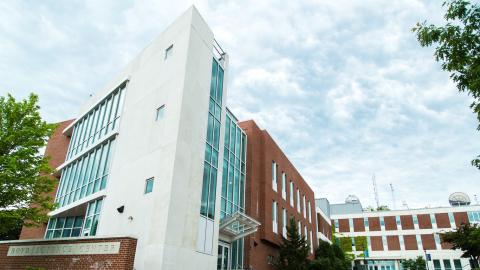A collaborative and adaptable program.
The word “forensic” relates the application of scientific methods and techniques to the investigation of a crime. Plymouth State’s forensic program is geared to both science and non-science students who love investigation and problem-solving. Plymouth State Forensic is the first baccalaureate degree program from a public university in New Hampshire.
The collaborative and project-based emphasis of Plymouth State’s Cluster Learning model combined with core program studies in Criminal Justice and Chemistry along with specialized course work from Psychology, Computer Science, Biology, and Anthropology gives our students unmatched opportunity to excel in this field. Professionals and distinguished faculty from each field will be involved in training our students. The BS in forensic science is a STEM-orientated program that emphasizes a solid theoretical foundation and laboratory skills while cultivating a critical, detail-oriented approach to investigations. The curriculum features modern laboratory setups and instrumentation. An important consideration is given the huge surge in interest in careers that are experiencing exponential occupational growth, including forensic laboratory specialty, forensic psychology, and computer information security.
As a Forensic scientist, you can work in laboratories or at crime scenes. You may work as a private investigator, insurance officer, a cyber security analyst. You may choose to work for private and public offices or laboratories.
The curriculum is adaptable enough for students to obtain additional specialties and/or minors in Chemistry, Psychology, Criminal Justice, and Biology with few additional courses using their free electives.
Curriculum & Requirements
| Course | Title | Credits |
|---|---|---|
| Major Requirements | ||
| CH 1050 | Laboratory Safety | 1 |
| FS 1200 | Majoring and Working in Forensic Science | 1 |
| CJ 1020 | Criminal Justice in Action | 4 |
| CJ 2045 | Criminal Procedure | 4 |
| CH 2255 | Techniques in Laboratory | 3 |
| CH 2335 | General Chemistry I (QRCO) | 4 |
| CJ 3005 | Criminal Investigation | 4 |
| CJ 3025 | Forensic Science | 4 |
| CH 3550 | Instrumental Analysis (TECO,WRCO) | 4 |
| FS 4100 | Forensic Science Capstone Project | 3 |
| Math Foundation Skills | ||
| Take one of the following: | 3-4 | |
MA 2300 | Statistics I (QRCO) | |
MA 2130 | Precalculus (QRCO) | |
MA 2550 | Calculus I (QRCO) | |
| Interdisciplinary Focus Areas | ||
| Take at least 9 credits of (1000/2000) courses and at least 15 credits of (3000/4000) courses 1,2 | 24-32 | |
===Forensic Lab Analysis Specialty=== | ||
BI 1110 | Biological Science I (TECO) | |
BI 1120 | Biological Science II | |
BI 2030 | Invertebrate Zoology | |
CH 2340 | General Chemistry II | |
BI 3060 | Genetics | |
CH 3370 | Organic Chemistry I | |
CH 3380 | Organic Chemistry II | |
CH 3410 | Physical Chemistry: Thermodynamics and Kinetics (WRCO) | |
AN 3605 | Forensic Anthropology | |
CH 4600 | Internship | |
===Digital Forensic Specialty=== | ||
CS 2010 | Computing Fundamentals (TECO) | |
MA 2550 | Calculus I (QRCO) | |
MA 2560 | Calculus II (QRCO) | |
CJ 3015 | Cybercrime | |
CS 3420 | Introduction to Cybersecurity | |
CS 4500 | Topics in Computer Science and Technology | |
CS 4420 | Computer Security | |
CS 4520 | CyberEthics (DICO,WRCO) | |
===Forensic Psychology Specialty=== | ||
PS 2015 | Introduction to General Psychology | |
PS 2055 | Lifespan Developmental Psychology | |
PS 3035 | Social Psychology | |
PS 3115 | Research Methods and Statistics I (QRCO,TECO) | |
PS 3125 | Research Methods and Statistics II (WRCO) | |
PS 3220 | Cognitive Psychology | |
PS 3325 | Psychopathology | |
PS 3705 | Psychology and Law | |
PS 4365 | Internship in Psychology | |
PS 4945 | Independent Research in Psychology | |
| General Education Requirements | ||
| EN 1400 | Composition | 4 |
| IS 1115 | Tackling a Wicked Problem | 4 |
| CTDI | Creative Thought Direction | 3-4 |
| PPDI | Past and Present Direction | 3-4 |
| SIDI | Scientific Inquiry Direction | 3-4 |
| SSDI | Self and Society Direction | 3-4 |
| Directions (choose from CTDI, PPDI, SIDI, SSDI) 3 | 4-8 | |
| DICO | Diversity Connection | 3-4 |
| WECO | Wellness Connection | 3-4 |
| INCP | Integrated Capstone | 4 |
| GACO | Global Awareness Connection | 3-4 |
| Electives | 24-14 | |
| Total Credits | 120 | |
- 1
To enhance career opportunities students may choose one or two interdisciplinary specialties as long as they take two lower-level and five upper-level courses. One thing students must be aware of is the courses in some specialties may have lower-level prerequisites associated with the same specialty. Students may use their free electives to choose additional courses to get a minor or a second major.
- 2
The courses from the Interdisciplinary Specialty can be applied towards one or more minor requirements. Possible minors of interest: Biology, Chemistry, Computer Science, Criminal Justice, Mathematics, Psychology.
- 3
Directions should total 20 credits (unless the major has a waiver for a specific Direction).
| Year One | Credits | |
|---|---|---|
| FS 1200 | Majoring and Working in Forensic Science | 1 |
| CH 1050 | Laboratory Safety | 1 |
| CJ 1020 | Criminal Justice in Action | 4 |
| CJ 2045 | Criminal Procedure | 4 |
| IS 1115 | Tackling a Wicked Problem | 4 |
| EN 1400 | Composition | 4 |
| Mathematics Foundations Course (take one of the following): | 3-4 | |
MA 2300 |
Statistics I (QRCO) | |
MA 2130 |
Precalculus (QRCO) | |
MA 2550 |
Calculus I (QRCO) | |
| One Directions Course (choose from CTDI, PPDI, SIDI, SSDI) | 3-4 | |
| One 1000/2000 level Focus Area course | 3-4 | |
| Credits | 27-30 | |
| Year Two | ||
| CH 2335 | General Chemistry I (QRCO) | 4 |
| CH 2255 | Techniques in Laboratory | 3 |
| CJ 3005 | Criminal Investigation | 4 |
| Two 1000/2000 level Focus Area courses | 8 | |
| Two Directions courses (choose from CTDI, PPDI, SIDI, SSDI) | 6-8 | |
| Additional Math (depending on Focus Area) OR Electives | 3-4 | |
| Credits | 28-31 | |
| Year Three | ||
| CH 3550 | Instrumental Analysis (TECO,WRCO) | 4 |
| CJ 3025 | Forensic Science | 4 |
| Two 3000/4000 level Focus Area courses | 8 | |
| Two Connections courses (choose from DICO, WECO, GACO) | 6-8 | |
| One Directions Course (choose from CTDI, PPDI, SIDI, SSDI) | 3-4 | |
| Electives | 3-4 | |
| Credits | 28-32 | |
| Year Four | ||
| FS 4100 | Forensic Science Capstone Project | 3 |
| Three 3000/4000 level Focus Area courses | 12 | |
| One Connections course (choose from DICO, WECO, GACO) | 3-4 | |
| INCP | Integrated Capstone | 4 |
| Electives | 6-8 | |
| Credits | 28-31 | |
| Total Credits | 120 | |
- Detail-oriented approach and ability to Validate sources and origins of error in crime investigations
- Purposeful communication: Demonstrate ability to interpret evidence and communicate results in both written and oral format.
- Integrated perspective: Work collaboratively with members of a team with diverse backgrounds.
- Professionalism: Even during a violent crime or chaotic conditions maintain composure and objectivity.
- Math and science skills: Forensic science technicians need a solid understanding of statistics and natural sciences to be able to analyze crime scene evidence.
As a Forensic scientist, you can work in laboratories or at crime scenes. You may work as a private investigator, insurance officer, a cyber security analyst. You may choose to work for private and public offices or laboratories. Careers in Forensic Science: Cybersecurity Analyst, Forensic Life Scientist, Information Security Specialist, Insurance Officer, Private Investigator.
Explore Program Details
-
Assistant Professor of PracticePhone: (603) 535-2289
-
Associate ProfessorProgram Coordinator of Biology (BA, BS, & MS), Cell & Molecular Biology, & Environmental BiologyEmail: hedoherty@plymouth.eduPhone: (603) 535-3181
-
Associate ProfessorAU Leader, Justice & SecurityEmail: lgdykstra@plymouth.eduPhone: (603) 535-3324
-
Assistant ProfessorPhone: (603) 535-2240

The heart of scientific research and study at PSU is the Boyd Science Center. The University’s proximity to the lakes, rivers and mountains of New Hampshire gives students access to a unique natural laboratory. Resources at Boyd provide students with a place to explore nature’s questions, generated in the great outdoors or under the microscope.
Resources at Boyd
- Climate-controlled chambers for whole organism research
- Dedicated spaces for student research
- PCR, Rt-PCR, Western blotting, Immunohistochemistry
- Animal behavior lab with advanced video tracking
- BSL-2 Microbiology lab
- Six 300-liter marine aquariums
- Human physiology lab
- Collection of bird specimens
- Dedicated tissue culture facility
- Rooftop greenhouse with computerized temperature controls and separate areas for preparation and growing
- PSH, an herbarium of 20K preserved and mounted specimens
Explore Today.
Realize Tomorrow.









